Course correcting vaccine misinformation

With Australia's timeline for COVID-19 vaccination shifting, talk has again turned to those opposed to jabs of any kind.
And a Queensland academic is hoping to help boost vaccination rates across the country with the world’s first Massive Open Online Couse (MOOC) dedicated to anti-vaccination and vaccine hesitancy.
Dr Tom Aechtner from the University of Queensland’s School of Historical and Philosophical Inquiry said while most Australians support immunisations, “there remains a subset of the population which expresses vaccine hesitancy”.
“This can involve concerns about the safety and efficacy of vaccinations, including fears about vaccine ingredients, overloading the immune system and the perceived likelihood of adverse vaccine-triggered side effects and ailments,” Aechtner said.
The MOOC works in tandem with website UQVaccinationChoice to provide evidence-based information, allowing people to make informed decisions about jabs.
The course, called AVAXX101, will start next month.
Research underpinning the course found that vaccination anxieties may be fuelled by small groups of media-vocal vaccine deniers.
“Australian anti-vaccination media focuses more on promoting distrust in officials and experts and propagating conspiracy narratives about vaccines than spreading stories about the purported dangers of vaccines,” Aechtner said.
“With this in mind, my research identifies the persuasion attributes of Australian anti-vaccination media and the ways that counter-vaccine messages employ persuasive cues when communicating to Australian publics.”
An Australian National University survey released late last year revealed 6 per cent of Australians are certain they won’t get a COVID-19 jab once one is made available.
A further 7 per cent feel they’re unlikely to get a vaccine.
The majority surveyed (58.5 per cent) said they will be sure to join the vaccine queue. About three in ten (28.7 per cent) said they were likely to opt in but were still unsure.
Study co-author Associate Professor Ben Edwards said overall there are significant levels of vaccine hesitancy or resistance across the country.
Australia’s Chief Medical Officer Paul Kelly on Sunday said “confidence is the key” ahead of Australia’s rollout of the COVID-19 vaccine next month.
He said the federal government’s $24 million advertising campaign would encourage Australians to get the vaccine when it becomes available.
“We know there are some parts of the community who are more hesitant about vaccines,” he said.
“We need to build confidence in this particular vaccine.
“The approvals and such have gone fast, much faster than usual – for a reason, because of that danger that we are in and trying to get back to some sort of normal life.
“But absolutely, and I’ll say this again, as we’ve said many times, there are no shortcuts.
“Every tick that needs to be ticked will be ticked before there is any rollout of this vaccine into the community.”
Prime Minister Scott Morrison said the government hopes to vaccinate 80,000 Australians a week, and four million by the end of March.
In an opinion piece written for The Conversation, Professor of Epidemiology Healthcare Infection and Infectious Diseases Control at UNSW Mary-Louise McLaws said the government’s plan to vaccination Australians will require “NASA-like logistics”.
“Intact delivery of Pfizer’s vaccine famously requires an ultra-cold chain of -70℃. Each “shipper box” holds 975 vials, each containing five doses.
“According to Pfizer, once opened, a box requires dry ice every five days, delivered within 60 seconds of lifting the lid, to maintain its temperature. From the first opening of a box, the full contents of 4,875 doses must be injected within 30 days,” McLaws said.
She added there are also challenges around having the right number of recipients at each vaccination session arriving at the right time and for those people to get the second dose at the correct interval for the type of vaccine.
“Even with the best-laid plans, the vaccine rollout could still be derailed if resources are drained by having to respond to new COVID clusters,” McLaws added.
“Ultimately, success hinges not just on vaccine logistics but also on tightening the remaining weaknesses in our processes for quarantine and handling returned travellers. Removing the distraction of outbreaks will give us the best chance of getting enough people successfully vaccinated.”
Email: [email protected]





